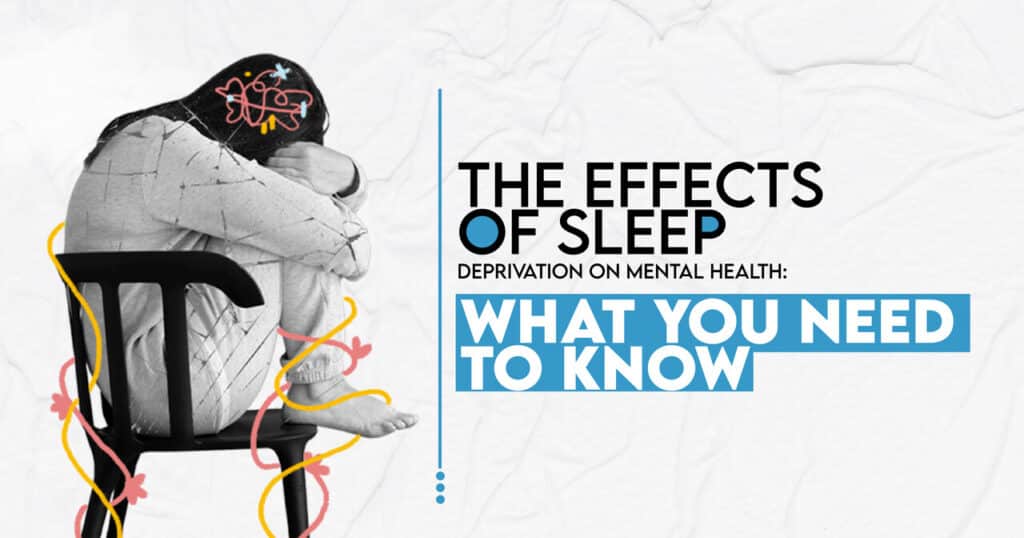The significance of a proper sleep routine cannot be overstated – whether you are unable to feel fresh and energetic ahead of important exams or work assignments or you cannot stick to a consistent sleep schedule, lack of sleep will negatively affect your life in many ways. Some of the consequences may not be visible at first yet insufficient sleep will lead to long-term challenges if you choose to ignore this problem.
Our guide will help you learn more about the connection between sleep deprivation and mental health, as well as figure out effective ways to address this issue for your physical and psychological well-being.
Understanding Sleep Deprivation
Sleep deprivation can be defined as a lack of sleep whether you went to bed late due to being busy or were unable to fall asleep when you wanted to close your eyes, rest, and recharge. On average, a human being spends a third of their life sleeping – it is an essential part of existence. When your attempts to fall asleep are unsuccessful, it may mess up the upcoming day and have long-term consequences for your health.
The Psychological effects of poor sleep are well-documented – from increased levels of stress hormones to mood swings, the adverse effect of only three or four hours of sleep preceded by hours of worry and insomnia becomes apparent and may seriously disrupt a person’s life.
How Sleep Deprivation Affects Brain Functioning
It is one thing to feel tired occasionally when you fail to sleep for at least seven or eight hours, but in addition to the mental health impacts of sleep deprivation, you may have to deal with cognitive impairment.
| Symptom | Description |
Irritability |
You are feeling impatient, annoyed, and on edge, and you cannot pinpoint a particular reason for your behavior |
Emotional Instability |
You are reacting disproportionately when facing a minor issue and going from a good mood one minute to feeling down very quickly |
Memory Issues |
You are no longer focused on the task at hand, have trouble memorizing or recalling things, and are incapable to concentrate when talking to someone |
| Trouble With Concentration | You cannot stay alert long enough to participate in otherwise trivial activities such as driving the car |
Short-Term Effects of Sleep Deprivation on Mental Health
Even after one night of staying awake, you may deal with the negative consequences of sleep deprivation:
| Symptom | Description |
Poor Reaction Time |
Whether you are solving a math problem or dealing with a workplace dispute, lack of sleep will slow down your brain function |
Drowsiness |
When you feel exhausted and sleepy during the day, you may fail to do your job properly and even pass out while commuting or driving |
Physical Pain |
Muscle aches, migraines, lower back pain – sadly, there are several physical symptoms you will feel in the morning after being up at night |
Long-Term Consequences of Chronic Sleep Deprivation
The relationship between sleep deprivation and mental health becomes obvious when insomnia persists and remains unresolved:
| Symptom | Description |
High Blood Pressure |
If you do not sleep enough, there is a danger of developing heart disease, including high blood pressure. In case you have struggled with cardiovascular issues in the past, pay close attention to your sleep routine. |
Weight Gain |
Your hormones may be all over the place when your sleep is restricted; besides, many people decide to resolve their sleepiness during the day by consuming energy drinks and eating food that contains sugar which means a higher calorie intake. |
Depression |
Sleep and mental well-being are interconnected. In many cases, depression is diagnosed after a healthcare provider learns the patient has not slept as much as their body requires. |
The Connection Between Sleep Loss and Specific Mental Health Disorders
Anxiety and Sleep Deprivation
The link between nervousness and sleep problems is well-known – numerous people fail to fall asleep quickly plagued by their thoughts whether they have a solid reason to worry or not. Various relaxation methods – from breathing exercises to aromatherapy – should alleviate this problem in the short run.
Depression and Lack of Sleep
Sleep deprivation is one of the main symptoms of depression – it is rather common to struggle with sleep when you suffer from a major depressive disorder. Once you are diagnosed with depression, let your therapist know if you sleep too much or do not sleep enough – they will advise you and prescribe medication that will treat this symptom.
Bipolar Disorder and Sleep Patterns
Research shows people with bipolar disorder often sleep less – unfortunately, this may trigger a manic episode especially when a sleep disturbance is combined with stress or a change in medication. Make sure you adhere to a regular sleep cycle and visit a doctor upon the first signs of insomnia.
Sleep and Stress: A Vicious Cycle
Feeling more stressed out than ever after an all-nighter, failing to sleep at night because tomorrow brings more reasons to worry – sometimes, it is hard to understand what came first, sleep or stress. Nonetheless, the seemingly neverending cycle can be broken – address the factors that make you feel anxious during the day and the night, introduce healthy practices in your lifestyle, and reach out to friends, family, and mental health professionals to share your struggles and ask for help.
Tips to Improve Sleep Quality for Better Mental Health
Here is what you can do to reduce and eventually eliminate the effects of sleep loss on mental health:
- Build a sleep schedule that suits you. While the recommended amount of sleep is eight hours, most people sleep at night, and full-time students and employees wake up early, there is no one-size-fits-all schedule to follow. As long as you wake up and go to bed at the same time without major fluctuations, you will accustom your mind and body to the fixed routine.
- Focus on your mental state before bedtime. Are you on your phone until it is time to sleep? Is the light in your bedroom bright? Are you getting enough fresh air at night? Instead of staring at the screen before you sleep, go for a short walk, meditate, and listen to calm music to relax.
- Make changes to your lifestyle. There may be habits that negatively affect your sleep and mental state – poor nutrition, consumption of alcohol, smoking, lack of physical movement, and even too much coffee during the day. While there is no need to give up on guilty pleasures you love, see if cutting down on certain things from the list lets you sleep better at night.
When to Seek Help for Sleep Issues and Mental Health Support
Is it necessary to go to a doctor to deal with sleep deprivation and mental health problems? There is no universal answer to that question. Some individuals are capable of coming up with a better sleep schedule and sticking to it without external help – they will see the benefits of this decision within a few weeks or months; others, however, will require a few therapy sessions to get to the bottom of the issue. A therapist will listen to your concerns, help you ascertain the reason behind the sleep deprivation, and give you a list of personalized medications that will assist you on the road to recovery.
Do I Need to Prioritize Sleep for My Mental Wellness?
We hope we have properly explained the importance of sleep for every person, old and young – in order to feel good during the day, no matter what activities you are involved in, it is crucial to tackle sleep deprivation and ensure your mental health remains a priority. The duration of sleep, comfortable bedroom environment, and a few techniques you can implement daily without much trouble will do wonders both for your mental and physical well-being.
In case you or a person you care about starts feeling the negative effects of sleep deprivation affecting both body and mind, remember you can always reach out to a mental health professional and enlist the support of a qualified therapist to improve your life.
FAQs
- Can sleep deprivation affect your mental health?
Sleep loss leads to numerous mental health issues – from temporary agitation to chronic depression, undermining the normal functioning of the person who struggles to sleep.
- What are the symptoms of sleep deprivation?
It is rather easy to notice you are not getting enough hours of sleep – headaches, short attention span, poor concentration, increased anxiety, and muscle fatigue are among the most common symptoms of this issue.
- What are the consequences of sleep deprivation?
From minor issues such as occasional forgetfulness to the lack of alertness on the road when you are behind the wheel of the car – in the long run, sleep deprivation will drastically reduce the quality of your life.
- What are the best strategies to deal with sleep deprivation?
If you cannot prevent sleep loss, you can still treat it. Lower your screen time, create a personalized bed routine that works for you, eat healthy food, and avoid caffeine and alcohol – making your sleep a priority even for a short time will massively benefit you in the future.
- Do I need therapy to cope with sleep deprivation?
You can increase your chances of conquering sleep deprivation if you are supported by a mental health professional equipped to help you – book a session with a therapist, tell them what bothers you, and adjust your sleep schedule together based on the suggestions of an expert.








